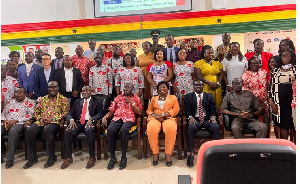Executive Director of the Economic and Organised Crime Office (EOCO), COP Maame Yaa Tiwaa Addo-Danquah (Mrs), has noted that while there is still much to be done in the fight against corruption, digitalization efforts that have led to e-governance and other transparency initiatives have played a key role in the fight.
Speaking on how anti-corruption institutions, civil society, and the citizenry have fared in the fight against corruption, she explained that e-procurement systems, digital tax systems, and the creation of anti-corruption platforms and mobile applications have been pivotal in the fight against corruption in the country.
"In recent years, Ghana's e-governance and transparency initiatives have played a significant role in fighting corruption by increasing transparency, improving efficiency, and reducing opportunities for corrupt practices," she noted at the Chartered Institute of Administrators and Management Consultants (CIAMC) Conference in Accra.
"The introduction and implementation of the E-Procurement Systems in Ghana," she continued, "has streamlined and digitized the procurement process, reducing human intervention and the potential for corrupt practices.
The E-Procurement platform allows for transparent and competitive bidding processes, ensuring that procurement decisions are based on merit rather than favouritism or bribery."
Digital Tax Systems
Online Tax Filing: The Ghana Revenue Authority (GRA) has introduced online tax filing systems, which reduce direct interactions between taxpayers and tax officials, minimizing opportunities for bribery.”
She recommended that to take the fight a notch higher, there is a need for everyone to have access to digital platforms so that the digital divide can be bridged.
“There is the need to bridge the digital divide by ensuring that all citizens, especially those in remote areas, have access to and can use digital platforms. There is also the need to train and educate public officials and citizens to effectively use e-governance tools,” she suggested.
General News of Tuesday, 30 July 2024
Source: mynewsgh.com

















